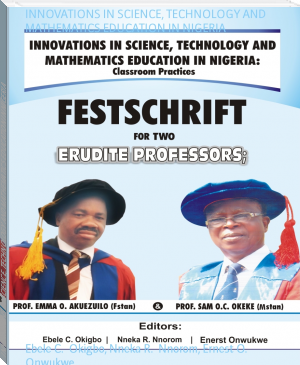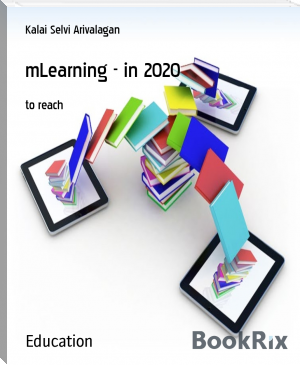INNOVATIONS IN SCIENCE, TECHNOLOGY AND MATHEMATICS EDUCATION IN NIGERIA - Ebele C. Okigbo, Nneka R. Nnorom, Ernest O. Onwukwe (best novel books to read TXT) 📗

- Author: Ebele C. Okigbo, Nneka R. Nnorom, Ernest O. Onwukwe
Book online «INNOVATIONS IN SCIENCE, TECHNOLOGY AND MATHEMATICS EDUCATION IN NIGERIA - Ebele C. Okigbo, Nneka R. Nnorom, Ernest O. Onwukwe (best novel books to read TXT) 📗». Author Ebele C. Okigbo, Nneka R. Nnorom, Ernest O. Onwukwe
though it" may include it, security is development
and without development there can be no security”.
In practice, national security is associated primarily with managing physical threat and with the military capabilities used for doing so. Now national security is widely understood to include non-military, including the security from terrorism, crime, economic security energy security, environmental security, food security, cyber security and so on. The potential causes of national insecurity includes other states (e.g. military or cyber attack), violent non-state actors (e.g terrorist attack) ,organized criminal groups such as narcotic cartels ,and multinational corporations also the effects of natural disasters (e.g. flooding, earthquakes).
Political security
Barry Buzan, Ole Wæver, Jaap de Wilde and others in an article published by the National Security Strategy (United States) and the Defence Strategic Policy and Intelligence Group of the Australian Department of Defence,2008 have argued that national security depends on political security. The political security which is the stability of the social order. They also pointed out that the equitability of the international order is equally vital. Hence, political security depends on the rule of international law (including the laws of war), the effectiveness of international political institutions, as well as diplomacy and negotiation between nations and other security actors. It also depends on, among other factors, effective political inclusion of inclusion of disaffected groups and the human security of the citizenry.
Economic security and financial security is the condition of having stable income or other resources to support a standard of living now and in the foreseeable future. It includes:
probable continued solvency
predictability of the future cash flow of a person or other economic entity, such as a country
employment security or job security
While financial security more often refers to individual and family money management and savings or tradable asset of any kind, economic security tends to include the broader effect of a society's production levels and monetary support for non-working citizens. https://en.wikipedia.org/wiki/National_security
Computer security, also known as cyber security or IT security, refers to the security of computing devices such as computers and smart phones, as well as computer networks such as private and public networks, and the Internet. It concerns the protection of hardware, software, data, people, and also the procedures by which systems are accessed, and the field has growing importance due to the increasing reliance on computer systems in most societies. Since unauthorized access to critical civil and military infrastructure is now considered a major threat, cyberspace is now recognized as a domain of warfare. This form of security embraces the area of data security (cryptography) and wavelet transformation (signals intelligence).
Food security
People are considered food secure when they have availability and adequate access at all times to sufficient, safe, nutritious food to maintain a healthy and active life. Food security analysts look at the combination of the following three main elements:
Food availability: Food must be available in sufficient quantities and on a consistent basis. It considers stock and production in a given area and the capacity to bring in food from elsewhere, through trade or aid.
Food access: People must be able to regularly acquire adequate quantities of food, through purchase, home production, barter, gifts, borrowing or food aid.
Food utilization: Consumed food must have a positive nutritional impact on people. It entails cooking, storage and hygiene practices, individual’s health, water and sanitations, feeding and sharing practices within the household.
https://www.wfp.org/node/359289
Statement of the problem
National security is inherently a function of the economy, and the economy is inherently a function of educational attainment. The ability of our people to appreciate and act on the connection between educational attainment and our national and international strength depends on their being ready to be, and motivated to participate as, responsible citizens. To achieve this, there is need for Mathematics education which serves a tool for exercising the reasoning faculties. This is supported by The Director in the Ministry of Defence, Nigerian Air Force Computer Unit, Sam Ethnam Air Force Base, Lagos, Mr. Oladipupo Ogbara, who on Friday, March 3, 2017, while speaking as a Guest Speaker on the “Role of Mathematics in National Security,” at the Town and Gown seminar organized by the Department of Mathematics, Covenant University, Ota, noted that the national security of any country is of great importance to the military as they leave no stone unturned to achieve a highly secured nation. To achieve this, he said, “The services of national security analysts who are also known as intelligence analysts will always be needed. The caliber of people needed for these jobs are the mathematics graduates. Mathematicians are therefore greatly needed in national security.”To this end, the research investigated the undergraduate science students’ perception on the impact of mathematics to national security.
Purpose of the study
Generally, the study sought to find the perception of undergraduate science students of NwaforOrizu College of Education, Nsugbe on the impact of mathematics on National security. Specifically, the study sought to find out from the sampled science students’:
1. Their perceptions on the impact of mathematics on national security
2. If their perceptions on the impact of mathematics on national security vary based on their gender.
3. If their perceptions on the impact of mathematics on national security vary based on their area of specialization.
Research Questions
The following research questions guided the study:
1. What is the mean perception of the sampled science students’ on the impact of mathematics on national security?
2. Does the perception of the male science students on the impact of mathematics on national security vary with their female counterpart?
3. Does the perception of the sampled science students on the impact of mathematics on national security vary based on their area of specialization?
Method
The descriptive survey design was used for the study. This is because the study involves gender and area of specialization. The purposive sampling technique was used to select a sample of ninety-four (94) volunteer science education students from 100 to 300 levels students of the school of sciences, Nwafor Orizu College of Education, Nsugbe Anambra State offering any of biology, physics, chemistry, integrated science or computer science as their area of specialization. The20 -item questionnaire were generated through face to face interviews with students and three science educators. The items generated were arranged into four sub-sections namely political security, economic and financial security, computer security and food security. The instrument was weighted in a four –point scale for the responses thus: Strongly Agree (SA-4 points), Agree (A-3 points), Disagree (D-2 points) and Strongly Disagree (SD-1 point). The instrument was validated by three science educators in Nwafor Orizu College of Education, Nsugbe. The instrument was trial tested using ten non participating students from the school of languages, arts and social sciences who filled ten questionnaire. From the data collected and analyzed using the split half reliability coefficient, the reliability coefficient of 0.96was obtained .This is considered very positive and high by the researcher to be fit for the study. A face-to-face method of administration was adopted to ensure a hundred percent return by inviting the 94 volunteered undergraduate sampled science students to the department were they were assisted to answer the questionnaire by two lecturers of the Mathematics department who acted as research assistants. Data collected for the study were analyzed using descriptive statistics of frequency counts, mean, and standard deviation. The decision criterion of mean (X) rating less than 2.50 indicate disagreement of the items which represented a negative response, while the mean (X) rating greater than or equal to 2.50 indicates agreement of the items which represented a positive response. This was obtained by adding all the points on the scale (4+3+2+1) =10 and dividing by 4, which gives 2.50 as the basis of the decision on each item. Also the lower the standard deviation, the higher the uniformity of the perception level among the respondents.
Results
The results of the analysed data are presented in tables sequentially based on the research questions thus:
Research Question1. What is the mean perception of the sampled science students’ on the impact of mathematics on national security?
Table 1: Responses of sampled science students’ perception on the impact of mathematics on national security.
S/No.
ITEMS
MEAN
SD
DECISION
Political Security
1
Mathematics plays an important role in shaping the social reality of any nation, through the use of the “marginalization index” which is a measure based on a mathematical model. (see Sánchez 2009 and Sánchez 2010),
3.68
0.92
Agree
2
Mathematics is not presented to the students as a tool that can be used for prescribing our political and economic reality.
1.97
0.85
Disagree
3
mathematics cannot be used to legitimize and justify political decisions that directly and significantly affect the social dynamics of some communities and the lives of their inhabitants.
1.83
0.81
Disagree
4
Models in economical planning, traffic planning, environmental planning and planning of energy supply and production are not examples for mathematical models that are used by the political or administrative systems to predict the possible effects of changes or regulations in these systems.
2.06
0.85
Disagree
5
political scientists uses rigorous mathematical techniques as a social-science tool for creating methods to explain—and even predict—the actions of adversaries, thus making society safer as well as smarter.
1.96
1.07
Disagree
Economic security and financial security
6
Mathematics skills such as counting and budgeting are needed for personal financial security.
3.92
1.13
Agree
7
The valuing of bonds , stocks, liabilities, savings loans and overdraft and commission on transfer (C.O.T) are not done using numbers.
2.00
1.02
Disagree
8
Stochastic calculus is used to obtain the values of derivatives of a particular stock
2.50
1.01
Agree
9
Mathematical skills are not used in measuring the Gross Domestic Product(G.D.P) which is a primary indicator that is used to gauge the economic health of a country .
1.56
0.84
Disagree
10
Other economic indicators like Human Capital Index(H.C.I),Education Index(EI),Income Index (II)and so on, do not requires mathematics skills like ratios and percentages ,ordinal counting to measure it.
2.21
0.93
Disagree
Computer security
11
The modular arithmetic and prime numbers is not the aspect of mathematics used in data security(that is ,data encrypting and decrypting).
2.30
0.98
Disagree
12
Wavelet analysis applies mathematics and physics in solving difficult civil and security problems.
2.74
0.94
Agree
13
Some applications of wavelets are powerful statistical tools used in signal processing for detecting the properties of quick variation of values; in internet traffic description for designing the service size
2.73
0.97
Agree
14
Some applications of wavelets are not powerful statistical tools used in internet traffic description for designing the service size.
2.33
0.91
Disagree
15
The defence base like the military, navy, e.t.c uses Wavelet applications to detect aircraft and submarines.
2.89
0.92
Agree
Food Security
16
Food security indicators such as Household Food In Security Access Scale(HFIAS);
1.98
0.90
Disagree
17
Food security can be expressed explicitly using mathematical variables as percentages, rates, graph and numbering.
1.89
0.99
Disagree
18
Food security uses mathematical variables to measure the Household Dietary Diversity Scale (HDDS),that is the number of different food groups consumed over a specific reference period..
2.79
0.99
Agree
19
Food security cannot be expressed explicitly using mathematical variables to measure Household Hunger Scale (HHS)
2.19
1.02
Disagree
20
Food security can be expressed explicitly using mathematical variables to measure Coping Strategies Index (CSI),that is ,assessing household behavior and rate them based on asset of varied establishment behaviours.
2.72
1.10
Agree
Table 1 indicated the perceptions that mathematics has an impact on: political security as evidenced in items numbers one to five; economic and financial security as evidenced in items numbers six to ten ;computer security as evidenced in items number eleven to fifteen; and food security as evidenced in items numbers sixteen to twenty.
Research Question 2: Does the perception of the male science students on the impact of mathematics on national security vary with their female counterpart?
Table 2: Mean and standard deviation responses of males and female sampled science Students on the impact of mathematics on national security .
DIMENSIONS OF NATIONAL SECURITY
ITEMS NO.
MALES
GRAND
FEMALES
GRAND
MEAN () DIFFERENCE
MEAN ()
SD
MEAN ()
SD
Political security
1-5
2.51
0.89
2.52
0.90
-0.01
Economic and financial security
6-10
2.57
0.92
2.48
1.07
0.09
Computer security
11-15
2.55
1.00
2.63
1.11.
-0.08
Food security
16-20
2.52
.097
2.51
1.03
0.01
TOTAL
0.01
From Table 2, the total grand mean difference of 0.01 was obtained, this shows that the perceptions of the sampled science students on the impact of mathematics on national security with respects to the four dimensions of national security discussed is comparable and negligible.
Research Question 3: Does the perception of the sampled science students on the impact of mathematics on national security vary based on their area of specialization?
Table 3:Mean and standard deviation responses of sampled science students based on their area of specialization on the impact of mathematics on national security
From table 3, the grand mean perception of the sampled





Comments (0)